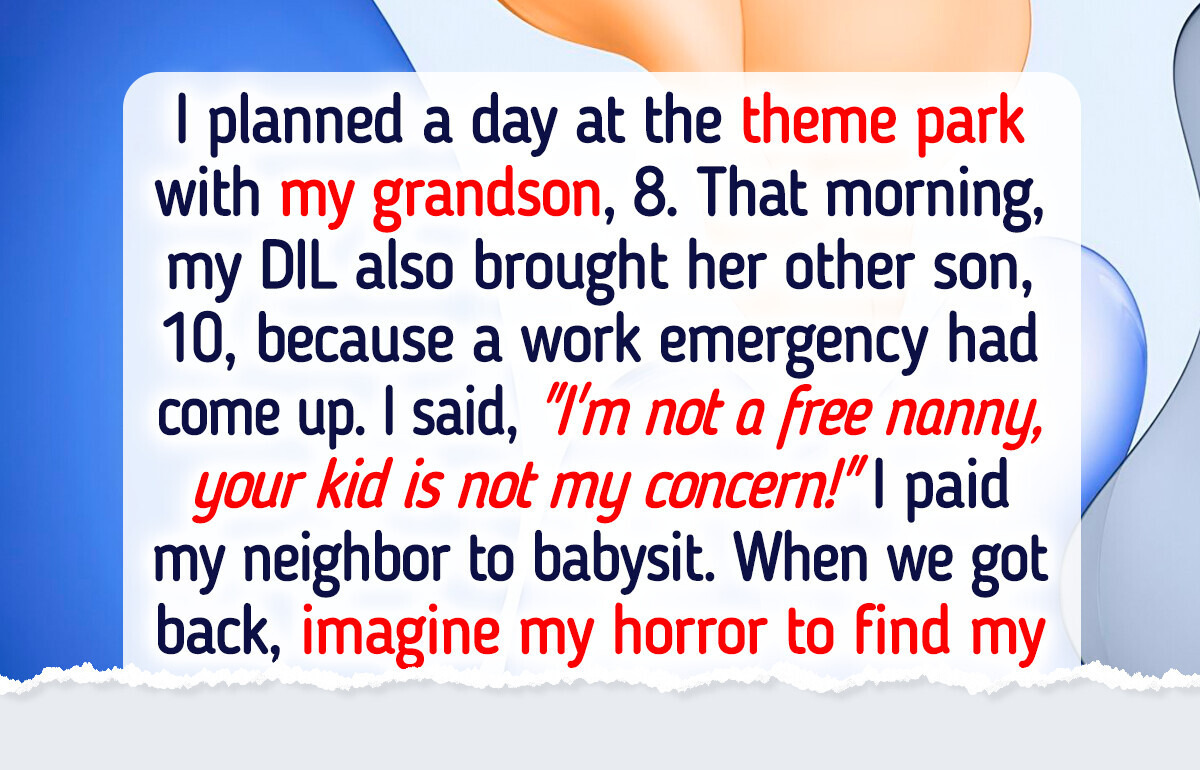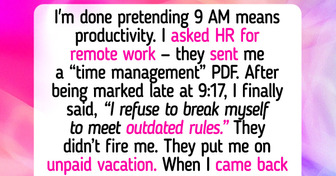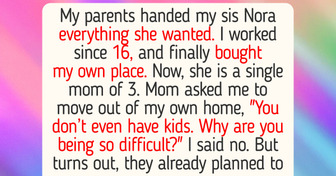Most of the commentators seem to have missed the last line: "He’s not related to me, and I don’t understand why I’m expected to care for him." This sounds like 8 years (or more) of dissing the step grandson, and DIL set the final trap, albeit a bit deceitful. The correct answer would have been (if the relationship was cordial) - " I promised "b" time with grandma, so lets have X watch A today and I will take A by himself soon (and mean it.) On these pages and others, parents or grandparents often lose the connection to the non-golden child -- you probably lost both and probably cost your son his marriage because he did not protect his stepson. This was not a one-off reaction but a final eruption of long simmering discontent.
I Excluded My DIL’s Son From Our Theme Park Trip

Family relationships can get complicated, especially when blended households and different expectations come into play. What feels fair to one person can seem deeply hurtful to another, and small misunderstandings can quickly grow into major conflicts. Recently, we received a letter from a reader who shared her experience of facing this exact kind of challenge during a family outing.
Teresa’s letter:
Hi Bright Side,
I had planned a special day at the theme park with my 8-year-old grandson. That morning, my daughter-in-law dropped off her other son, who’s 10, because a work emergency had come up at the last minute.
I told her, “I’m not a free nanny, your kid is not my concern!” But she was in a rush, left him with me, and headed to work.
I had been planning this day for weeks to spend one-on-one time with my grandson, and I didn’t want it to be ruined. So I called my neighbor, whom we trust with the kids, and paid her to watch my DIL’s child.
Once we got to the park, my son called me in a panic, saying, “Mom, you will never see him again.”
I couldn’t really understand what he meant and thought he was talking about my DIL’s son.
I didn’t think much of it and hung up, then continued the day with my grandson. We had a lovely time.
But when we returned home, imagine my horror to find my son with a couple of suitcases, waiting for me. He explained that while I was away, his wife had picked up her son and told him to leave the house.
I guess she didn’t like that I excluded her child, and she decided to take it out on my son. She had also decided I was no longer allowed to see my grandson.
Was it really so wrong to want a day alone with my beloved grandson, without having to bring my DIL’s child along?
He’s not related to me, and I don’t understand why I’m expected to care for him.
Am I wrong for thinking this way?
Teresa

Thank you, Teresa, for opening up about such a difficult situation. It’s clear you adore your grandson and wanted this day to be special, but things spiraled into conflict with your daughter-in-law in a way you didn’t expect. Here are some tips to help you with this situation.
Redefine “One-on-One” Time as a Privilege, Not a Rejection

Marriage does not a make a bond. I am tired of all these people claiming this is her grandson because his mother married her son. This child has his own set of paternal and maternal grandparents. The mother put herself and son in this situation.
- Situation: You wanted a private day with your grandson, but excluding the other child looked like rejection.
- Action: Frame one-on-one days as something you rotate fairly: one trip with your grandson, another time with both boys, maybe even a solo quality time with the older one.
- Why it Matters: This shows you weren’t rejecting your DIL’s son — you were honoring your grandson. Turning it into a “special privilege” rather than “pushing out the other child” softens the blow.
Repair Trust Through Transparency

You are not wrong. If she wants to keep her son away from you so be it. You did not have to watch her son. She should have taken her son to his father's side of the family or watched him herself.
- Situation: Leaving the 10-year-old with a neighbor (even a trusted one) without clearing it first likely shocked your DIL.
- Action: Acknowledge this specifically: “I should have called you before making that choice — I see how it looked like I abandoned him.”
- Why it Matters: It doesn’t mean you accept the blame for everything, but it pinpoints the action that escalated the conflict and shows accountability.
Use Your Son’s Stay as a Strategic Pause
- Situation: Your son came to you with suitcases, emotionally shaken, and you’re his only safe place right now.
- Action: Instead of venting about his wife, use his stay to gather his perspective calmly. Ask him directly: “What would help you rebuild peace with her — and what do you need from me?”
- Why it Matters: This puts you in the role of an ally, not an opponent of his marriage. Supporting him wisely may help reopen the door to seeing your grandson again.
Create a Neutral Gesture Toward Your DIL
- Situation: Right now, she sees you as having “sided against” her child.
- Action: Send her a small but thoughtful gesture — a card, a meal, or even an offer to spend a day with both boys next time — with a note that says: “I love them both and never meant to hurt anyone.”
- Why it Matters: It doesn’t erase your desire for one-on-one time, but it shows goodwill and a willingness to make her son feel included, which may soften her stance.
Speaking of tensions in blended families, Rachel refused to let her husband’s daughter move in — but what followed was an unexpected twist. Read the full story here.
Comments
Shame on you. Boy, I'm glad my stepfamily didn't treat me that way. I'm 64 and I'm still considered family.
I like how people on here are getting on someone that they know not enough about and acting like they would just take any child to an expensive place no matter what. You people need to get off it. Did the dil offer up any money to help? No one here knows all the financial details or anything else except the little bit we were able to read. Judge not people
NTA you had a special day planned w/ your grandson. It was something you were looking forward to. Even tho I probably would have made a special day w/ your grandson another day. Your son's being a jerk who doesn't appreciate what you do for him. That the DIL controls your son is sad that he didn't understand or hear your side of the story. They'll come crawling back when they need something. I'd say no to them. I'm suspicious of your DIL. I think she was trying to set you up. How's your relationship w/ her ? Is she jealous of the relationship you have w/ your son ?
Y'all are quick to judge grandma here, one we have no clue of the dynamics between the 2 women. Two grandma clearly stated she planned and saved for weeks for her and the 8 yr old. So, I would probably assume that grandma is on a fixed income like most elderly. Also, the DIL having an emergency at work is her problem not her MIL's. Should she have said what she said no BUT again we do t know the relationship between MIL and DIL. In this situation everyone sucks and it started with the DIL.
Not wrong. We don't have all the pieces of the puzzle. Nothing wrong with granny planning a special trip/day.
Maybe she's on a financial budget. Those parks aren't free. Maybe the other kid is scared of rides, scared of people. He could have potty issues we don't know about.
That mom/Karen should have gave dollars if she wanted her kid included in their day trip.
A long time ago grandparents could spoil kids everywhere. Now those grandparents are struggling as well.
Related Reads
I Refused to Split the Bill of Food I Didn’t Eat—I’m Not a Walking ATM

I Refuse to Be in the Office by 9 AM—I’m Burned Out, and HR’s Policies Are Stuck in the Past

I Absolutely Refuse to Give Up My Apartment for My Sister and Her 3 Kids

10 Times Micromanaging Bosses Got Exactly What They Asked For—And Regretted It

I Accepted My Father’s Inheritance—And It Ruined My Life

I Refuse to Return My Late Colleague’s Paycheck, Now His Widow Is Furious

10 Moments Where Kindness Didn’t Argue—It Acted

I Refused to Watch My DIL Give Birth— She Made Sure I Regretted That Moment

11 People Whose Small Acts of Kindness Turned Tears Into Smiles

I Refused to Pay for Our Valentine’s Dinner—Then I Learned the Heartbreaking Truth

13 Stories That Show Kindness Is the Calm in Every Storm

I Refused to Talk to My Parents After They Chose My Ex-Wife Over Me


